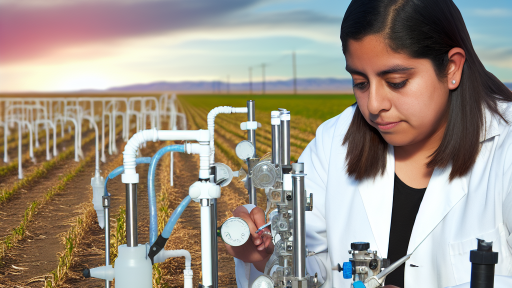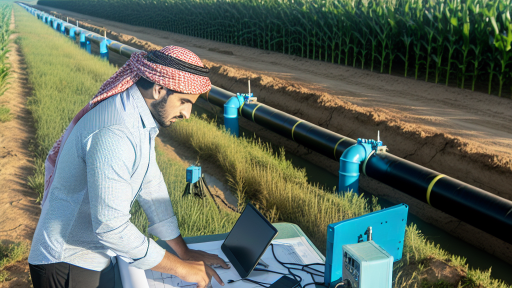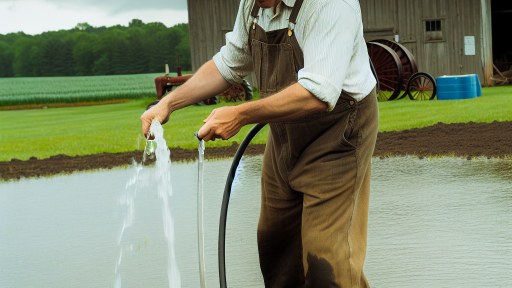Introduction to Sustainable Agriculture and the Need for Adaptation
Sustainable agriculture focuses on farming practices that are environmentally friendly.
This approach emphasizes resource conservation and ecological balance.
Farmers increasingly face challenges like climate change, soil degradation, and resource scarcity.
Adapting sustainable practices helps them navigate these issues effectively.
The Importance of Sustainable Practices
Sustainable agriculture promotes biodiversity and ecosystem health.
It reduces reliance on chemical fertilizers and pesticides.
Additionally, it enhances soil fertility and water conservation.
This leads to healthier crops and improved resilience against pests.
Climate Change and Agricultural Adaptation
Climate change impacts crop yields and farming viability.
Farmers must adapt their strategies to shifting weather patterns.
These adaptations can include crop rotation and cover cropping.
Such strategies improve soil health and mitigate climate effects.
The Role of Technology in Adaptation
Technology plays a pivotal role in promoting sustainable agriculture.
Precision farming tools optimize resource use and increase efficiency.
These technologies help farmers monitor soil health and moisture levels.
Transform Your Agribusiness
Unlock your farm's potential with expert advice tailored to your needs. Get actionable steps that drive real results.
Get StartedMoreover, they enable more informed decision-making and planning.
Community Engagement and Knowledge Sharing
Community involvement enhances the adoption of sustainable practices.
Farmers can share experiences and best practices with each other.
Local workshops and training programs support knowledge sharing.
By collaborating, communities can strengthen their agricultural resilience.
Key Principles of Sustainable Agriculture Practices
Ecological Health
Sustainable agriculture prioritizes ecological health in farming practices.
This approach enhances biodiversity and promotes soil fertility.
Moreover, it aims to reduce the use of harmful chemicals and synthetic fertilizers.
Resource Conservation
Conservation of natural resources is essential for sustainable agriculture.
This includes the effective management of water, soil, and energy resources.
Farmers can adopt techniques such as crop rotation and cover cropping to maintain soil health.
Social Responsibility
Sustainable agriculture addresses social equity in farming communities.
It promotes fair labor practices and supports local economies.
Additionally, it encourages community engagement and consumer education.
Economic Viability
Economic viability ensures that farming practices maintain financial sustainability.
Farmers must find a balance between stewardship and profitability.
This involves assessing market demands and implementing efficient strategies.
Adaptable Practices
Sustainable agriculture embraces adaptable practices to meet changing conditions.
Farmers should be ready to implement new technologies and methods.
Continuous learning and innovation are vital for long-term success.
Assessing Environmental Changes
Understanding Local Ecosystems
To implement sustainable agriculture, farmers must assess their local ecosystems.
This understanding will help them adapt to environmental changes effectively.
Farmers should consider factors such as soil health, water availability, and climate patterns.
These elements significantly impact crop yield and sustainability.
Showcase Your Farming Business
Publish your professional farming services profile on our blog for a one-time fee of $200 and reach a dedicated audience of farmers and agribusiness owners.
Publish Your ProfileEvaluating Soil Quality
Soil quality serves as a foundation for sustainable agriculture.
Farmers should conduct regular soil tests.
Such tests reveal nutrient levels and pH balance.
A healthy soil fosters robust plant growth and biodiversity.
Moreover, improving soil organic matter can enhance resilience to climate effects.
Monitoring Water Resources
Water availability is critical for crop production.
Farmers must monitor local water sources and usage.
Conservation strategies can help secure water supplies during dry periods.
Implementing drip irrigation can increase efficiency and reduce waste.
Understanding Climate Patterns
Climate patterns directly influence agricultural practices.
Farmers should analyze historical weather data for their region.
This analysis helps anticipate seasonal variations and extreme weather events.
Furthermore, knowing these patterns allows for timely planting and harvesting.
Engaging with Local Experts
Collaboration with local agricultural experts can provide valuable insights.
These professionals can offer advice tailored to specific regions.
Participating in community workshops enhances knowledge about sustainable practices.
Engaging with local universities can also lead to beneficial research partnerships.
See Related Content: Adapting Farming Practices To Climate Shifts
Soil Health Management: Techniques for Building Resilience
Understanding Soil Health
Soil health is vital for sustainable agriculture.
Healthy soil contributes to productive ecosystems.
It provides nutrients for plants and supports beneficial organisms.
Importance of Organic Matter
Organic matter enhances soil structure and fertility.
It improves water retention and encourages healthy microbial life.
Incorporating compost increases organic matter in the soil.
Farmers should consider cover crops to boost organic content.
Diverse Crop Rotation
Diverse crop rotation prevents soil depletion.
Rotating different crops promotes nutrient balance.
This method disrupts pest and disease cycles effectively.
Farmers should plan their rotations to include legumes.
Reduced Tillage Practices
Reduced tillage safeguards soil structure and microbiomes.
This practice minimizes erosion and water loss.
Farmers can use no-till or minimum till techniques.
These methods help maintain soil health over time.
Utilizing Cover Crops
Cover crops prevent soil erosion during off-seasons.
They enhance soil nutrient availability and reduce weeds.
Farmers can select species like clover or rye.
These crops add organic matter and promote biodiversity.
Integrated Pest Management
Integrated pest management (IPM) supports healthy crops.
This approach minimizes chemical use in farming.
Farmers can monitor pests and use natural predators.
Showcase Your Farming Business
Publish your professional farming services profile on our blog for a one-time fee of $200 and reach a dedicated audience of farmers and agribusiness owners.
Publish Your ProfileMoreover, it reduces the risk of pest resistance.
Regular Soil Testing
Regular soil testing informs farmers about nutrient levels.
This practice enables targeted fertilization strategies.
Farmers should sample soil at least once a year.
Results guide amendments for improving soil health.
Uncover the Details: Investing in Climate Resilience to Boost Farm Economics
Water Conservation Strategies
Understanding Water Needs
Identifying water needs is crucial for sustainable agriculture.
Farmers must assess crop requirements throughout different growth stages.
This understanding helps in optimizing water use effectively.
Employing Efficient Irrigation Techniques
Drip irrigation significantly reduces water waste in fields.
This system delivers water directly to the plant roots.
Farmers can also consider using sprinklers for larger areas.
Furthermore, soil moisture sensors can enhance water application.
Implementing Rainwater Harvesting
Collecting rainwater is an effective strategy for agricultural irrigation.
Farmers can install cisterns to store this natural resource.
Using rain barrels can supplement regular water supplies.
Utilizing Mulching Practices
Mulching conserves soil moisture by reducing evaporation.
This practice also suppresses weed growth, enhancing efficiency.
Organic materials, like straw or wood chips, work best for mulching.
Monitoring and Managing Water Usage
Regular monitoring of water usage helps identify inefficiencies.
Farmers can utilize technology to track and analyze water consumption.
This data-driven approach fosters informed decision-making.
Education and Training
Farmers benefit from ongoing education on water conservation techniques.
Participating in workshops can enhance skills and knowledge.
Connecting with local agricultural extensions offers valuable resources.
Find Out More: Choosing Flood-Resistant Crop Varieties for Your Farm
Crop Diversity and Rotation
Enhancing Biodiversity for Better Yields
Crop diversity plays a crucial role in sustainable agriculture.
It enhances biodiversity, leading to healthier ecosystems.
Farmers can increase resilience through diverse crops.
Different plants have varying nutrient needs and pest resistances.
This variety minimizes the risks of crop failure.
Benefits of Crop Rotation
Crop rotation improves soil health significantly.
Planting different crops helps replenish nutrients in the soil.
It prevents the buildup of pests and diseases.
Subsequently, this method leads to healthier and more productive crops.
Moreover, crop rotation can enhance water retention in the soil.
Implementing Effective Strategies
To optimize crop diversity, farmers should research suitable combinations.
For instance, legumes can help fix nitrogen levels in the soil.
Additionally, introducing cover crops can protect against soil erosion.
Farmers should also track crop performance over time.
Showcase Your Farming Business
Publish your professional farming services profile on our blog for a one-time fee of $200 and reach a dedicated audience of farmers and agribusiness owners.
Publish Your ProfileRegular evaluations can identify the most beneficial practices.
Community and Knowledge Sharing
Collaboration among farmers fosters the exchange of knowledge.
Joining local agricultural groups can provide valuable resources.
Workshops and seminars can educate on best practices.
Farmers can learn about new crop varieties and sustainable methods.
Such community efforts enhance overall agricultural productivity.
Discover More: Building Resilient Farms Amid Climate Uncertainty

Integrating Technology: Precision Agriculture for Sustainable Outcomes
Understanding Precision Agriculture
Precision agriculture utilizes technology to enhance farming efficiency.
This approach collects data to inform decision-making processes.
Farmers can minimize input costs while maximizing yields.
Additionally, it minimizes environmental impacts associated with traditional methods.
Key Technologies in Precision Agriculture
Several technologies play a crucial role in precision agriculture.
- GPS technology guides farmers for accurate field mapping.
- Drones provide aerial imagery for crop monitoring.
- Soil sensors measure moisture levels for optimal irrigation.
- Data analytics allows for precise application of fertilizers and pesticides.
Benefits of Precision Agriculture
One major benefit is increased crop productivity.
Farmers achieve better yields through informed decision-making.
Moreover, this practice promotes resource conservation.
For instance, water usage is reduced through precise irrigation techniques.
Finally, economic sustainability improves as costs decrease.
Challenges to Adoption
Despite its benefits, challenges remain in adopting precision agriculture.
High initial costs pose a significant barrier for many farmers.
Additionally, a lack of technical knowledge can hinder implementation.
Farmers may also face connectivity issues in remote areas.
Collaboration with technology providers can help overcome these challenges.
Future Trends in Precision Agriculture
The future of precision agriculture is promising and innovative.
Artificial intelligence will enhance data analysis capabilities.
Robotics may automate routine tasks, increasing efficiency.
Furthermore, sustainable practices will become more integrated with technology.
Ultimately, technology will continue to shape sustainable agriculture.
Community Engagement and Education
The Role of Farmers’ Cooperatives
Farmers’ cooperatives play a crucial role in sustainable agriculture.
They foster community engagement and build stronger local networks.
Additionally, cooperatives provide education on best practices.
This education promotes sustainable farming techniques.
Many cooperatives offer workshops and training sessions.
These sessions often cover crop rotation and organic farming.
Farmers can share experiences and knowledge within these groups.
Furthermore, cooperatives facilitate access to resources.
They may offer seeds, fertilizers, and tools at discounted rates.
This support helps individual farmers maximize their productivity.
Community Involvement
Engaging the community is essential for cooperative success.
Cooperatives often host community events to raise awareness.
Through these events, they promote the benefits of sustainable practices.
Showcase Your Farming Business
Publish your professional farming services profile on our blog for a one-time fee of $200 and reach a dedicated audience of farmers and agribusiness owners.
Publish Your ProfileCommunity involvement strengthens relationships among farmers.
Moreover, it encourages new members to join cooperatives.
Local residents often benefit from educational opportunities as well.
These programs can enhance local food systems and economies.
Information Sharing and Resources
Cooperatives facilitate information sharing among members.
This collaboration enhances problem-solving capabilities.
Members can discuss challenges and share solutions.
Additionally, cooperatives provide access to research and data.
They keep members informed about market trends.
Cooperatives may partner with universities and research institutions.
These partnerships help disseminate valuable agricultural information.
As a result, farmers can make informed decisions.
Advocacy and Policy Change
Cooperatives also play a role in advocacy efforts.
They represent farmers’ interests in policy discussions.
By working together, they can influence agricultural policies.
Such collaboration strengthens the voice of rural communities.
Cooperatives can advocate for sustainable practices effectively.
They aim to create a more equitable agricultural system.
Policy Frameworks and Support Systems for Sustainable Practices
Importance of Policy Frameworks
Policy frameworks establish the foundation for sustainable agriculture initiatives.
They guide decision-making and resource allocation at all levels.
Furthermore, well-structured policies promote environmental stewardship.
They create incentives for farmers to adopt sustainable methods.
Current Government Initiatives
Various government programs support sustainable agriculture practices.
The USDA plays a vital role in promoting sustainable farming.
For instance, it offers grants for conservation projects.
Additionally, the USDA’s Environmental Quality Incentives Program aids farmers financially.
Collaboration with Local Communities
Local governments and organizations greatly enhance sustainable practices.
They often tailor initiatives to meet specific regional needs.
Community-supported agriculture programs foster collaboration and engagement.
Moreover, local outreach educates farmers on sustainability benefits.
Building Support Systems for Farmers
Support systems are essential for successful adaptation of sustainable practices.
Access to education and resources encourages knowledge transfer.
Organizations like the National Sustainable Agriculture Coalition provide valuable resources.
Workshops and training programs empower farmers with practical skills.
Financial Assistance Programs
Financial assistance provides crucial support for transitioning to sustainable farming.
Farmers often face high upfront costs for implementing new practices.
Grants, loans, and subsidies can mitigate these financial barriers.
States also offer programs tailored to local agricultural contexts.
Research and Development Support
Innovative research is vital for advancing sustainable agriculture.
Public and private research institutions collaborate effectively.
Showcase Your Farming Business
Publish your professional farming services profile on our blog for a one-time fee of $200 and reach a dedicated audience of farmers and agribusiness owners.
Publish Your ProfileThey explore new technologies and practices to improve efficiency.
Moreover, research findings help inform policy decisions.
Engagement of Non-Governmental Organizations
Non-governmental organizations actively promote sustainable agriculture.
They raise awareness and foster community involvement in initiatives.
NGOs provide technical assistance to farmers aiming to adopt sustainable practices.
In addition, they often work as advocates for policy changes.
Future Directions for Sustainable Policy Frameworks
Future policies must adapt to emerging challenges in agriculture.
This includes climate change impacts and shifting consumer demands.
Stakeholder collaboration will be essential in this process.
Continuing to invest in education will prepare farmers for the future.
Additional Resources
11 Ways Farmers Are Adapting to Climate Change | Earth.Org
Climate-Smart Agriculture and Forestry Strategy: 90-Day Progress …




